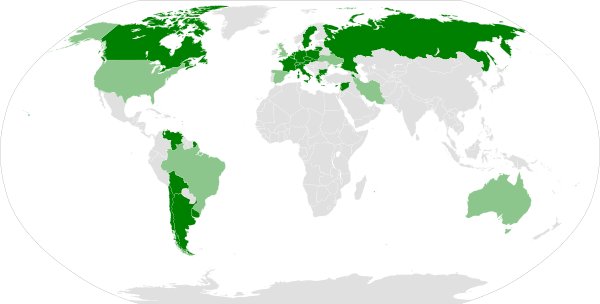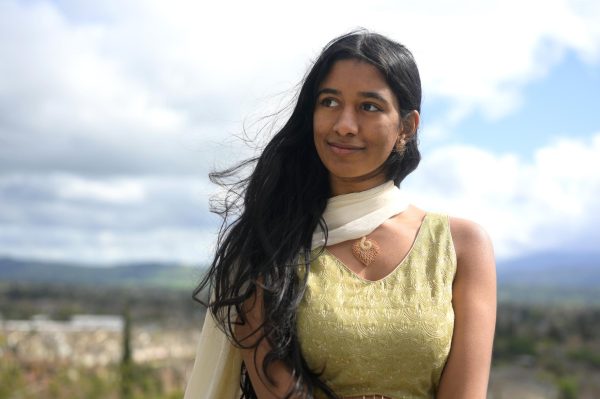America’s failure to recognize the Armenian Genocide

This map shows international recognition of the Armenian Genocide. Dark green countries have recognized the genocide; light green countries contain states or municipalities which recognize the genocide.
During his 2008 run for office, President Obama pledged to recognize the Armenian Genocide, the mass killing of over 1.5 million ethnic Armenians, Assyrians, Greeks, and other ethnic groups by the Ottoman Empire. The 100th anniversary of the genocide on April 24 marked the seventh year that he has not fulfilled this pledge.
Many countries, including the USA, have followed Turkey in refusing to refer to the mass killings of 1915 as a “genocide.” This standpoint is disputed by the majority of historians, who consider it to be the first genocide of the modern era. In fact, the term “genocide” was first coined by a historian, Raphael Lemkin, to describe the Armenian catastrophe in particular.
And I can understand why Obama hesitates to recognize the genocide. America has two military bases in Turkey which proved to be instrumental in the beginning of the Iraq war and are still strategically significant. And modern Turkey denies the slaughter despite its occurring during the reign of the Ottoman Empire. So at its heart, Turkey’s denial of the genocide stems from national pride.
However, that is not to say that the problem must be dealt with by Turkey alone. We as a country should push for Obama to recognize it, so that he and other world leaders might pressure Turkey to recognize it. On a personal level, the widespread denial of the genocide disturbs me because of the precedent it sets. Governments will often locally edit their accepted history, drawing out their citizens’ chauvinism to support their actions. Textbooks are edited to become agreeable, authorities publicly dispute statistics and certain opinions become verboten. While censorship is already unacceptable on a cultural scale, the multinational denial of the Armenian Genocide is the first of its kind. No other issue comes to mind where one country’s censorship extends well beyond its borders.
A few nations have owned up to their crimes. Germany apologized for instigating WWI, as well as for the actions of the Nazis in WWII. America apologized for the wartime internment policies against the Japanese. Spain even apologized to former Jewish citizens for the Inquisition. But there are still several atrocities that have been denied or forgotten – such as the Rape of Nanking, the Rwandan Genocide and Korean comfort women. And although recognizing the Armenian Genocide would only be one step by one country for one atrocity, it would set an American precedent of seeking the truth. As it is now, America is an international bystander.
Derek Yen is a senior and the Opinion Editor of Winged Post. Derek served as the STEM Editor of Aquila and Winged Post during his junior year and as a...































![Setter Emma Lee (9) sets the ball to the middle during the match against Pinewood on Sept. 12. “[I’m looking forward to] getting more skilled, learning more about my position and also becoming better friends with all of my teammates, Emma said.](https://harkeraquila.com/wp-content/uploads/2023/09/DSC_4917-2-1200x795.jpg)















































































![“[Building nerf blasters] became this outlet of creativity for me that hasnt been matched by anything else. The process [of] making a build complete to your desire is such a painstakingly difficult process, but Ive had to learn from [the skills needed from] soldering to proper painting. Theres so many different options for everything, if you think about it, it exists. The best part is [that] if it doesnt exist, you can build it yourself, Ishaan Parate said.](https://harkeraquila.com/wp-content/uploads/2022/08/DSC_8149-900x604.jpg)


![“Animation just clicked in a way. I had been interested in art, but that felt different. [Animation] felt like it had something behind it, whereas previous things felt surface level. I wasnt making that crazy of things, but just the process of doing it was much more enjoyable, Carter Chadwick (22) said.](https://harkeraquila.com/wp-content/uploads/2022/08/Screen-Shot-2022-08-16-at-9.44.08-AM-900x598.png)


![“When I came into high school, I was ready to be a follower. But DECA was a game changer for me. It helped me overcome my fear of public speaking, and its played such a major role in who Ive become today. To be able to successfully lead a chapter of 150 students, an officer team and be one of the upperclassmen I once really admired is something Im [really] proud of,” Anvitha Tummala (21) said.](https://harkeraquila.com/wp-content/uploads/2021/07/Screen-Shot-2021-07-25-at-9.50.05-AM-900x594.png)



![“[Volleyball has] taught me how to fall correctly, and another thing it taught is that you don’t have to be the best at something to be good at it. If you just hit the ball in a smart way, then it still scores points and you’re good at it. You could be a background player and still make a much bigger impact on the team than you would think,” Anya Gert (’20) said.](https://harkeraquila.com/wp-content/uploads/2020/06/AnnaGert_JinTuan_HoHPhotoEdited-600x900.jpeg)

![“Im not nearly there yet, but [my confidence has] definitely been getting better since I was pretty shy and timid coming into Harker my freshman year. I know that theres a lot of people that are really confident in what they do, and I really admire them. Everyones so driven and that has really pushed me to kind of try to find my own place in high school and be more confident,” Alyssa Huang (’20) said.](https://harkeraquila.com/wp-content/uploads/2020/06/AlyssaHuang_EmilyChen_HoHPhoto-900x749.jpeg)













![“My slogan is ‘slow feet, don’t eat, and I’m hungry.’ You need to run fast to get where you are–you arent going to get those championships if you arent fast,” Angel Cervantes (12) said. “I want to do well in school on my tests and in track and win championships for my team. I live by that, [and] I can do that anywhere: in the classroom or on the field.”](https://harkeraquila.com/wp-content/uploads/2018/06/DSC5146-900x601.jpg)

![“I think getting up in the morning and having a sense of purpose [is exciting]. I think without a certain amount of drive, life is kind of obsolete and mundane, and I think having that every single day is what makes each day unique and kind of makes life exciting,” Neymika Jain (12) said.](https://harkeraquila.com/wp-content/uploads/2017/06/Screen-Shot-2017-06-03-at-4.54.16-PM.png)


















